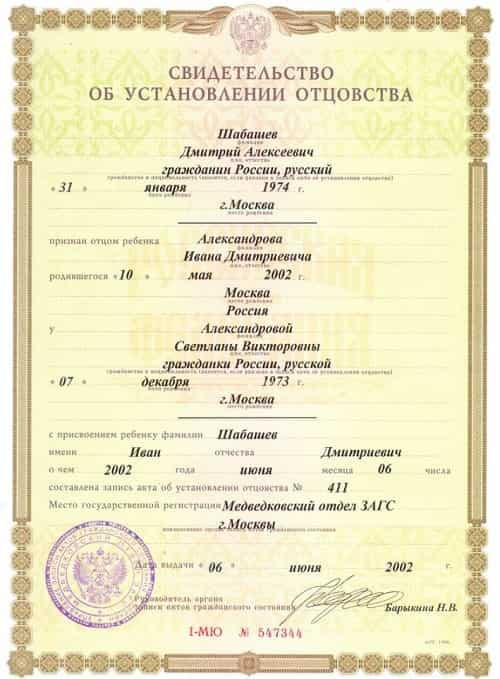Author of the article: Yulia Kaisina Last modified: January 2021 9875
Typically, the relationship between parents and children is recorded on the birth certificate. The full names of the father and mother are indicated there, which is sufficient evidence of the relationship. However, in some cases, an additional certificate of paternity may be required. Where to apply for it, who can do it and what documents will need to be collected.
Why do you need a paternity certificate?
A paternity certificate is issued to legitimize the relationship between a man and a child.
Typically, information about the father is entered into official documents in accordance with the marriage certificate. In this case, a man is automatically recognized as the father of a child if the baby is born in marriage or within 300 days after the divorce. But if the baby’s parents are not legally married, or the child’s mother cannot be present when filing the application (she died, was declared missing or incompetent), a certificate of paternity is required to establish a legal connection between the child and the man. After the certificate is issued, it becomes possible for a man to:
- communicate without interference with the child and participate in his upbringing;
- represent the interests of a minor in court and other authorities;
- in case of inability to work, demand alimony from the grown child;
- enjoy the benefits provided by law, receive benefits, etc.;
- father and child can inherit each other's property without making a will.
After receiving the document, the woman has the right to demand child support from the man. But at the same time, she loses the privileges provided for single mothers.
The procedure for establishing paternity in Russia
To recognize parental legal relations, the origin of children is established. The family legislation of the Russian Federation in Chapter 10 defines the procedure in which the origin of children is established and the fact of paternity is established. Establishing paternity is required in many cases. Establishing paternity in the Civil Registry Office is voluntary. It can also be done through the court. In both cases, a certificate of paternity is issued.
The procedure for establishing paternity depends on different situations:
- whether the child’s parents are married;
- the parents are not married, but the man recognizes the child voluntarily;
- the couple is not married, the man does not want to acknowledge paternity.
Note that establishing paternity and maternity is influenced by the fact whether the mother is legally married or not.
In cases where a child is born while married, or within nine months after separation, the marriage is declared invalid, if the spouse is killed or dies - after death. Paternity is certified by a marriage record.
What does a paternity certificate look like?
The document is drawn up on a special form containing several degrees of protection: watermarks, official seal, etc.
It states:
- document's name;
- information about the child: full name before paternity is established, gender, place and date of birth, nationality (optional);
- Full name of the child's father and mother;
- Full name of the child after paternity has been established;
- entry from the book of acts on the issuance of a certificate;
- official seal and signature of the official.
In addition, each form contains a unique series and number.
How to get a document?
A document is issued only after collecting a certain list of official papers. To whom it can be issued:
- the child’s mother or father who did not officially register their relationship on the child’s birthday;
- the child’s father in situations where the mother cannot participate in the process on the basis of legislation;
- guardian or trustee;
- a person who has a dependent child;
- to the child himself after he reaches adulthood.

The document can be issued to parents, guardians or the child himself
You can apply for a certificate:
- on a personal visit;
- via mail;
- with the help of a trusted person.
If you decide to use postal services, all documents and the application must be certified by a notary. When the authorized representative is involved in filling out the application, he must attach a power of attorney, which is also certified by a notary.
The application must be written exclusively by hand, on a special form. It is issued by employees of the authorized body.
You can also obtain a certificate of paternity from the responsible authority. It is provided if you present a payment document confirming payment of the state duty, as well as a passport.
On a note! It is also necessary to take a document confirming the citizen’s right to issue such a document.

You need to pay a state fee
A certificate or certificate is issued on the date of writing the application if the entire package of official papers is correctly completed and given to the authorized body.
Who issues the document
A certificate of paternity can only be obtained from the registry office; other authorities are not authorized to issue it. It is also not possible to submit documents online or through the MFC.
Expert commentary
Leonov Victor
Lawyer
You can receive the document at the place of registration of one of the parents. It is also issued by the authority that issued the child’s birth certificate. If the basis for obtaining a certificate of paternity was a judicial act, you can contact the registry office at the location of the court.
To issue a certificate of paternity, you will need to pay a state fee of 350 rubles.
How is the procedure registered?
After the birth of the baby, if the woman is in a registered marriage, then there is no need to further confirm the paternity of the baby.
The data on the birth certificate is then indicated automatically. However, if the parents decide not to get married, then they will have to spend time on additional activities.
On a note! Having established paternity, parents receive a special official document that has legal weight and gives an idea of who the father of the child is.

Such a certificate is needed if the child’s parents are not married.
When both parents live peacefully, even without officially registering the relationship, no problems will arise. You just need to contact the registration authority and fill out an application.
Unfortunately, in some situations, men do not want to take responsibility for the child and leave the woman. Then you have to resort to the help of the court. Only after receiving an official verdict does she have the right to receive a certificate from the registry office.
On a note! However, it also happens that the mother does not want to indicate the father on the birth certificate and does not want to recognize him as the father at all. Then the man has the right to go to court.

Sometimes mothers themselves do not indicate the father on the birth certificate
When the authorized body issues a certificate:
- if the child’s parents visited the registry office together, providing a list of necessary documents;
- if the father wrote a statement in cases where the mother: died, is under arrest, declared incompetent or missing;
- it is necessary to obtain a positive verdict from the guardianship authority in all cases mentioned above;
- there is a court decision regarding the fact of paternity.
Note ! If parents have not yet reached the age of 18, this does not in any way prevent them from filing applications to recognize or challenge paternity. However, the general rules apply to them.

Even if the parents are minors, they are subject to general rules
The certificate can be obtained from the registering organization:
- at the place of residence of one of the parents;
- according to the city of registration of the child’s birth;
- according to the locality in which the trial took place.
There are no time limits, so you can submit an application to any authority at any time. This application is accepted regardless of how old the child is.
On a note! There is no statute of limitations for these claims.

You can apply for such a certificate at any time
Application procedure
If the decision to obtain a certificate of paternity is made by the parents mutually, it is enough to go to the registry office with a package of documents and fill out an application. You can do this:
- during the mother's pregnancy;
- simultaneously with submitting an application to register the birth of a child;
- at any time after the birth certificate is issued.
Expert commentary
Kamensky Yuri
Lawyer
If for some reason one of the parents cannot go to the registry office in person, he writes a separate application on his own behalf. The authenticity of the signature is confirmed by a notary.

In addition to the application from the parents, identification documents will be required. If the child has not yet been born, the woman will have to present a pregnancy certificate. When receiving a paternity certificate, you will need a certificate from the maternity hospital at the same time as your birth certificate. If a birth certificate was issued previously, but in a different name, this document will also need to be provided. When paternity is established in relation to an adult, written consent to this procedure will be required from him.
The issuance of a paternity certificate does not take much time, and can often be obtained on the same day. Based on it, changes are made to the journal of entries:
- indicate information about the child’s father or change existing information;
- new full name of the child.
Thus, previous entries are no longer valid.
What is it?
Citizens interested in issuing a document know why a certificate is needed - the document allows you to prove the status of the father and is required in cases where a specific person was not initially registered.
The document is drawn up on a special form with mandatory confirmation by the signature and seal of the registration authority of the civil registry office.
To understand the meaning of a certificate of paternity, what it is and in what cases it is used, you need to study the contents of the document. Mandatory parameters displayed in the document include:
- father's details;
- information about the child (full name, birth details, gender);
- a link to an act record that recorded the status of a specific person;
- child's full name;
- personal information about mom;
- details of the certificate establishing paternity.
Obtaining a certificate only by the father of the child
In some situations, a man applies for a certificate of paternity alone, without the participation of his mother. This can only be done in exceptional cases:
- the child's mother died;
- the woman was declared missing;
- the child's mother is declared incompetent;
- the mother has been deprived of parental rights.
Thus, at the request of a man, paternity is established only when the mother’s consent is virtually impossible to obtain or it does not have legal force.
The applicant will be required to:
- passport;
- a document confirming the inability of the child’s mother to participate in filing the application (death certificate, a final court decision on deprivation of parental rights, recognition as incompetent or missing);
- consent of the guardianship authorities (if the child is a minor).
Expert commentary
Kolesnikova Anna
Lawyer
As with a joint application, you will need the child’s birth certificate (if it was issued previously) and the adult’s consent that the applicant will be legally recognized as his father.
How to cancel a certificate?
This event takes place exclusively in court. The plaintiff may be:
- a man who is the official father of the child;
- mother or other citizens acting as parents: guardian, trustee, official representative.
- An 18-year-old child who has compelling reasons to dispute paternity (there must be unshakable evidence).
Note! There is no statute of limitations established by law. You just need to provide solid evidence, and then the court will render a verdict in favor of the plaintiff.

It is also possible to cancel a certificate of paternity.
The document is considered invalid if there is no blood relationship between the child and the parent. Again, strong evidence is needed. It should be noted that the judicial system puts the interests of the child first, so if a citizen decided to raise a minor child who is not his biological relative, and then wanted to “shed” these responsibilities, this is not so easy to achieve.
Reasons why people want to revoke a certificate:
- the natural father decided to raise the child;
- guardians, trustees or official representatives believe that for some reason the child’s father has no place in his life;
- the father is not the actual father (paternity must be contested).

The certificate will not be canceled without compelling reasons.
Note! Paternity cannot be challenged if a man marries a pregnant woman. Then he will automatically be recognized as dad.
Establishing paternity through court
In some cases, it may be necessary to establish paternity through the court:
- the mother refuses to indicate a man as the child’s father;
- the father refuses to recognize a child born out of wedlock;
- if the child’s mother has died or been deprived of parental rights, and the guardianship authority does not give consent to establish paternity.
The court, based on the documents provided, makes a decision whether the specified man can be recognized as the father of the child. If the decision is positive, the interested party applies to the registry office to obtain a certificate of paternity.
In this case, the applicant will additionally only need a passport and a receipt for payment of the fee, since the remaining information will be indicated in the court decision.
Establishment of paternity in the registry office
Establishment of paternity and maternity in the Civil Registry Office occurs upon voluntary recognition of the child by the father. This happens if the child’s parents are not married, but the man recognizes the child as his own and after his birth, together with the child’s mother, they submit an application to the civil registry office to establish paternity. The consent of the child's mother in cases where an application for voluntary establishment of paternity is written is mandatory. Here you will receive a certificate of paternity. This is how paternity is voluntarily established, paternity is established in the registry office, after which a certificate of paternity is issued.
Otherwise, it is necessary to prove in court that he is the blood father of the child. If it is impossible to obtain the father’s consent to recognize the child for various reasons (he has no desire to establish paternity, he has died or is very far away), an application to establish paternity is submitted to the court.
If the mother cannot give consent due to physical factors, such as death, recognition of her as incompetent, deprivation of rights, permission to voluntarily establish paternity is given by the guardianship authorities.
Voluntary establishment of paternity allows a man who recognizes a child as his own, regardless of his marital status, to officially confirm this fact by receiving a certificate of paternity.
The father and mother can submit an application to establish paternity at the same time, appearing together at the registry office, as well as separately, at different times.
Establishment of paternity, according to the law, can be performed even before the birth of the child, during the mother’s pregnancy. An application to establish paternity in the registry office is submitted and stored in the registry office until the child is born. But if, as soon as the baby is born, one of the parents withdraws the application, the establishment of paternity is considered failed.
If the parents lived without signing until the birth of the child, the man did not hide from friends and acquaintances the appearance of the child, whom he recognized as his own, but died without having time to register with the Civil Registry Office, a judicial determination of the fact of recognition of paternity takes place. The mother can obtain in court a posthumous establishment of paternity by her deceased common-law husband if she submits an application to establish paternity and there is a decision to establish paternity by the court. Write a statement of claim to establish paternity using the sample. The state duty will be 350 rubles. After receiving a court decision, a certificate of paternity is issued.
Posthumous establishment of paternity will make it possible to receive benefits; also, posthumous establishment of paternity will make it possible to claim the inheritance of the deceased father. These are good reasons why paternity determination is required.
Voluntary establishment of paternity cannot be used for persons who are declared legally incompetent because they have a mental illness. But for minors who are incapacitated due to mental illness, voluntary establishment of paternity is possible if they consent to it.
If voluntary establishment of paternity (establishment of paternity in the registry office) is impossible, for example, due to the death of the child’s mother, the man will have to prove in court that he is the father. While paternity is being established, the father can become the child's guardian. This will give him the opportunity to take the baby in and raise him while the court considers his application to establish paternity.
Unfortunately, it often happens in life when the alleged father does not recognize his paternity, voluntary establishment of paternity is impossible, the fact of paternity must be established in court.
To do this you need to prove:
- that at the time of conception the woman was actually living with the intended father, although she was not in a registered marriage with him;
- or that there was a fact of jointly raising or supporting a child with a man (which is quite difficult when a man does not want to acknowledge the fact of paternity);
- the basis for establishing paternity today, with the development of genetic fingerprinting, is increasingly the conduct of a medical identification examination with a fairly high level of accuracy in determining the biological relationship of the child and the putative father. This method is usually used when establishing paternity is required.
A statement of claim to establish paternity is written according to the sample. In order for the court to consider the case, it is necessary to attach a receipt for the paid state duty. Questions arise about how much it costs to establish paternity. From January 2021, the cost of the state duty is 350 rubles.
Paternity is established in court if there is evidence that a man and woman lived together. This may be written or photographic evidence. When considering the establishment of paternity, the court accepts the conclusion of a medical examination confirming that the man is the biological father of the child.
Also, to establish paternity, witness testimony is needed. Audio or video recordings confirming the couple's cohabitation are accepted.
When an application is rejected
An application for a certificate of paternity will be accepted only if there is no information about the child’s father in the registry office. If such data exists, then a court decision will be required on the basis of which it could be canceled (for example, a man who was listed as the father challenged this fact in court). But if the information was entered only from the words of the mother and was not supported by documents in any way, a statement from the parents will be sufficient.
Expert commentary
Gorchakov Vladimir
Lawyer
It is also impossible to cancel paternity if the child was born by a surrogate mother or as a result of artificial insemination, and the man gave written consent to this procedure.
Cancellation of paternity certificate
The basis for cancellation of a document is a court decision. An application can be made by:
- a man who is indicated in documents as the father of the child;
- the child's mother or other legal representatives;
- the biological father of the child, if paternity is registered in the name of another man;
- the child himself upon reaching adulthood.
At the same time, the desire to legally terminate paternity is usually not enough. It is necessary to provide the court with compelling reasons for such a step. If the initiators are the mother or the child himself, evidence must be presented that the father does not fulfill the duties assigned to him, poses a threat to the child, etc. In this case, the procedure is close to deprivation of parental rights, since it terminates the legal relationship between the man and the child.
A man can submit an application indicating that there is no biological relationship between him and the child. However, if this fact was known to him when issuing the paternity certificate, the claim will be denied. An exception is if the biological father of a minor has expressed a desire to independently take care of the child.

Where to contact
A document recording the fact of paternity is issued only by employees of the civil registry office after filling out an application and submitting a package of supporting papers.
The following categories of persons have the right to apply:
- civil partners;
- the father of a newborn in the event of death, incapacity, unknown absence of the mother, as well as after deprivation of maternal rights in relation to the baby;
- guardian (when applying to a person whose dependent is the child);
- guardian (if paternity of a child is established at an older age);
- an adult capable child after the age of 18, if paternity is determined by a judge.
Since the certificate can only be obtained through the registry office, the law provides exclusively for a written application to the registry office through special application forms filled out according to the sample. When the fact of paternity has been determined by the court and the decision has entered into force, an attorney can apply for the issuance of a certificate, submitting, along with the court ruling, a written power of attorney.
The place where the paternity certificate is obtained is the civil registry office, determined as follows:
- The registry office to which one of the parents who did not enter into a marriage belongs by registration;
- the department that issued the certificate for the newborn;
- at the address of the court that issued the decision on paternity (recognition or establishment).
Regardless of the place of application, they collect a certain list of papers to submit with the application.









